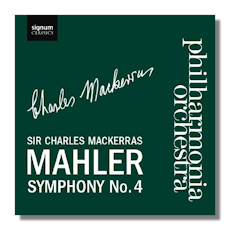
The Internet's Premier Classical Music Source
Related Links
- Mahler Reviews
- Latest Reviews
- More Reviews
-
By Composer
-
Collections
DVD & Blu-ray
Books
Concert Reviews
Articles/Interviews
Software
Audio
Search Amazon
Recommended Links
Site News
 CD Review
CD Review
Gustav Mahler

Symphony #4 in G Major
Sarah Fox, soprano
Philharmonia Orchestra/Charles Mackerras
Signum Classics SIGCD219
There is an unfortunate myth in classical music (okay, there are a ton of those) that you have to be a Mahler specialist to record Mahler. This unfortunately produces infinite remakes by the likes of the late Lorin Maazel – whose own in-progress Signum Classics cycle will now stay incomplete – and Bernard Haitink. However, some of the most satisfying Mahler has come from conductors who gave us very little of it. The Symphony #4 has always been a good option for those wishing to contribute to the discography, and both Reiner and Szell (just to name two) gave us classic versions.
This is another terrific entry, and the loss of Sir Charles Mackerras a few years back robbed the world of one of its most versatile and intelligent conductors. Mackerras was active for so long that we often took him for granted, but his best work remains remarkably compelling. And unlike many conductors as they age and battle illness, none of his later efforts suffer in comparison to his earlier work. This not only makes his remakes more palatable to the consumer, but also allows us to compare different recordings of a comparably high standard. Here, the Philharmonia Orchestra demonstrates a keen affinity for Mahler, while the conductor proves to be an able guide.
Far more than Maazel's somewhat stiff readings with the same orchestra, Mackerras' warmth and flexibility of phrasing allows the orchestra to relax. The wind playing is still obviously excellent within the ensemble, and the live acoustic captures the whole group very well. If Mackerras doesn't really "personalize" the piece to be his own, he at least gives a marvelously balanced and fully formed account. Muti and Slatkin were two other conductors who recorded almost no Mahler, and let the composer do all of the talking when they did. Mackerras makes the right choice. Soprano Sarah Fox sings with the requisite purity and innocence, and the entire affair has a rightness about it that – while it may not "wow" you like some of the conductors' other work – will bring you a greater appreciation for the legacy of the artists and the music at hand.
Copyright © 2015, Brian Wigman





















